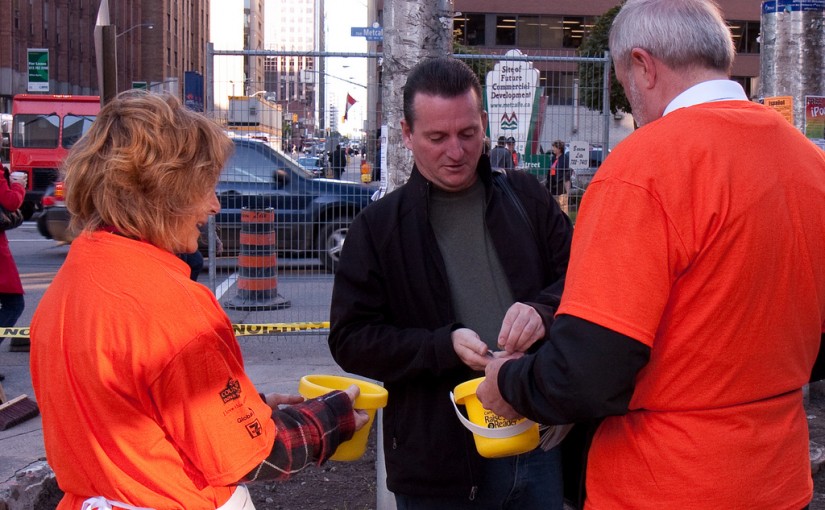Fundraising can be a daunting business, but you can make it easy if you break it down into the basics.
Why Fundraise?
Fundraising is an important part of life. To a certain group of people, species of animal, area of the planet, or otherwise – your mission matters. Raising money for your mission will have a very tangible impact on the existence of those that it targets.
The main point of fundraising is to raise funds for something that we need, for bills that need to be paid or to fund projects that need to be undertaken. If your group doesn’t raise this money, then who will? Fundraising is also a fantastic way to fulfill your group’s objectives, to offer something into your community and to raise awareness for your cause.
Many people have developed a cynicism about fundraising, but it’s important to remain clear about the reasons why this fundraising is important, and to maintain your conviction over what this money will mean for your cause. Fundraising enables groups and organizations all over the world to serve the planet in very important ways. Fundraising provides shelters and meals for the homeless, funds research for cancer, keeps school and churches open and provides medical aid for people living in third world conditions. Organizations that rely on donations can’t survive without fundraising – without it, much of the good work in the world would simply cease to exist.
Planning Your Fundraiser
An important thing to keep in mind is that successful fundraisers do not create themselves. They take work, time, commitment, passion and often monetary resources.
While some groups are natural cash generating machines, others need to learn the skills that make fundraising efforts successful. The good news is that good fundraising can be done by anyone who has the drive to make it happen– it just takes some planning!
The planning that goes into any fundraiser is going to be crucial to the success of the campaign. Every fundraiser that takes place, whether big or small, needs to have a concise, coherent plan written down which covers aspects of who/what/where/when and how. The success of your fundraiser will be a direct result of how much careful planning went into it.
Choosing a Team
Crucial to planning a fundraiser is having a dedicated team of people to plan it.
As early as possible, your event will need a committee dedicated to the fundraising event. This may be the same committee that works on other things within your organization or it may be a select group of people who are focused on the fundraising itself. These people will be responsible for contributing, and delegating substantial effort to the fundraising goal and to the event, or events, surrounding the fundraising.
Money Matters
Ensure that your fundraising has a goal set. You need to decide on what amount of money you plan to raise with your fundraising. Factors to take into account will be how much money your group needs to satisfy its immediate needs, how many people you estimate to attract, what expenses will have to come out of this amount and how much time you will have to raise the money. Whatever the amount, make sure that everything in your fundraising plan is driven towards raising this specific amount of money.
Ensure that your fundraising also has a budget in place. This should include all of the expenses that will be required to carry out your fundraising, right down to the pen you will need for signups. Make sure that the budget includes expenses on the day, marketing and promotional materials and payment for people that are not volunteers. Ensure that it also takes into account your fundraising goal, and that you will raise well above the amount of outgoings. You might also want to leave a little ‘wiggle room’ for unforeseen expenses that come up along the way.
Choosing How to Fundraise
Your fundraising committee will need to think about which events will take place, and what methods will be used to source money.
Will you;
- Ask via telephone?
- Ask face-to-face?
- Ask via email or direct mail?
- Hold an event?
When deciding how best to approach fundraising, (BTW, here’s 100 fundraising ideas), several things should be taken into account, including;
- Who is the target audience?
- What would provide good visibility?
- What would garner good attendance?
- What resources are available?
- How many people will be available to help out?
Once your committee has settled on the means of fundraising, a plan can be written up including all of the details. This plan will need to include basic details like location, date and time, as well as everybody’s roles, so that every person involved knows ahead of time what their responsibilities are.
Once this plan is in place, it’s time to promote, promote, promote!
Marketing
Now that everything is in place, you will need to aggressively market your fundraiser.
The fundraising team will need to decide how to show your organization’s current supporters and the general public why your fundraiser is worth their valuable time and money.
Firstly this will involve getting the word out amongst those you know. Sales and marketing professionals know that a warm hand is always better than a cold one. The same rule applies in the world of fundraising. The closer people are to you and your organization, the more likely they are to contribute to your cause when asked to. Make sure that everyone involved in the project is actively talking to their friends, families, neighbors and social networks, ensuring that everyone they know is aware of why this fundraising is important, and what difference it will make to the community. Once this is done, begin reaching out to the wider networks: local businesses, neighborhood contacts, people from other organizations that are relevant or linked to your own and any others who may share your organization’s concerns and feel moved to contribute.
Your community will be full of people who have money to give, and we cannot always predict who these people will be. Your most important ingredient in marketing is getting the word out there. If people don’t know about your fundraiser, then they can’t contribute anything towards it.
After the Money Has Been Raised
The importance of thanking people cannot be overstressed. Each and every contributor, no matter how big or small their donation, must be thanked. Before the fundraising committee folds, be sure that gratitude is expressed to everyone who was involved in the fundraising. This can be done via email, direct mail, phone or by a small event or gift to say thank you (just be sure to include this in your expense budget). And don’t forget your volunteers.
It’s quite simple: if you want people to put in the time and the money next time, you need to keep them happy.
 Last Minute Things
Last Minute Things
A few valuable tips to remember:
- The best fundraisers are the ones that offer something for everyone. Think about what you can offer as part of your fundraising that will benefit your contributors. If a fundraiser looks like a mutually beneficial offer, you have a better chance of people giving over their hard-earned cash for it.
- Good planning will be the make-or-break factor in any fundraising. The more you put into it, the more you will get out of it. Successful fundraisers do not happen if volunteers are not willing to get off the couch and make it happen.
- Fundraising is about far more than ‘money-making’. You want your fundraiser to create long-term relationships with people that will create awareness about your organization and its mission, as well as generating supporters that will become contributors at later fundraising events. Ultimately your fundraiser should be successful in the short term, generating the funds that you need for your project, as well as building your brand and database in the long term.



